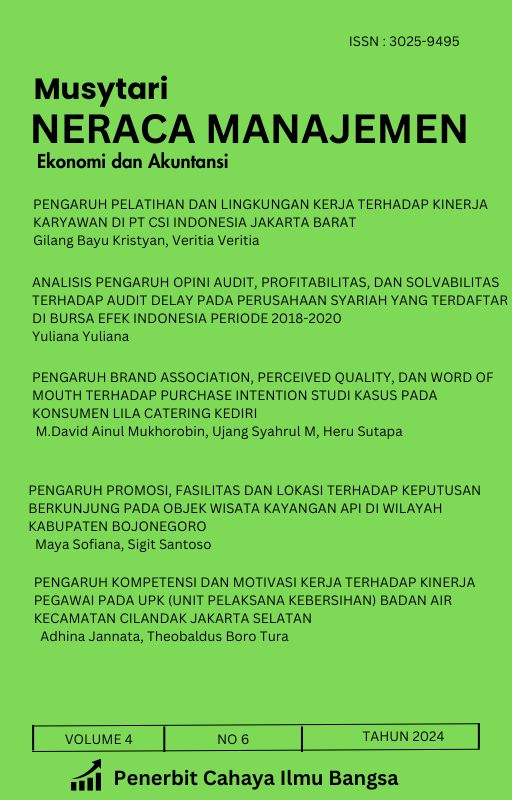Prinsip Manajemen Sumber Daya Islam pada UMKM: Etika dan Tanggung Jawab Sosial
Main Article Content
Abstract
This study aims to examine the application of ethical principles and social responsibility within the framework of Islamic Resource Management (ISRM) in Micro, Small, and Medium Enterprises (MSMEs) through a systematic literature study approach. Although MSMEs have a strategic role in economic development, they often face obstacles in adopting ethical and socially oriented business practices. Through the analysis of relevant literature, this study seeks to understand how MSDI values such as fairness, transparency, and social concern can be effectively applied in MSME operations. The methods used include a systematic literature study with a content and thematic analysis approach to scientific journals, books, and other academic sources. The findings show that ethical principles in MSDI, such as honesty and trustworthiness, as well as forms of social responsibility such as zakat and contribution to society, contribute positively to the performance and sustainability of MSMEs. The application of these principles is influenced by several factors, including business owner awareness, support from government policies, and market demands. In conclusion, the integration of MSDI values in MSME practices not only increases business profits but also provides real benefits to the community and the surrounding environment. For future development, it is recommended to conduct empirical research that highlights the implementation of MSDI in MSMEs in various cultural backgrounds and economic conditions.
Downloads
Article Details
Section

This work is licensed under a Creative Commons Attribution-NonCommercial-ShareAlike 4.0 International License.
How to Cite
References
Al Farisi, S., Iqbal Fasa, M., & Suharto. (2022). Peran Umkm (Usaha Mikro Kecil Menengah) Dalam Meningkatkan Kesejahteraan Masyarakat. Jurnal Dinamika Ekonomi Syariah, 9(1), 73–84. https://doi.org/10.53429/jdes.v9ino.1.307
Aziz Abdul, A. N. L. (2024). Etika Bisnis Islam: Teori dan Penerepan. Penerbit Arab. https://books.google.co.id/books?id=uOkjEQAAQBAJ&pg=PA9&dq=definisi+Etika+bisnis+islam&hl=en&newbks=1&newbks_redir=0&source=gb_mobile_search&sa=X&ved=2ahUKEwjEz4nd2OiNAxVx4jgGHVZ9KXIQ6AF6BAgLEAM%0A%0A
Bakir Moh. (2021). Tanggung Jawab Sosial Dalam AL-QUR’AN: Studi Analisis Terhadap Term Al-Islah. Jurnal KACA Jurusan Ushuluddin STAI AL FITHRAH, 11(1), 112–143. http://scioteca.caf.com/bitstream/handle/123456789/1091/RED2017-Eng-8ene.pdf?sequence=12&isAllowed=y%0Ahttp://dx.doi.org/10.1016/j.regsciurbeco.2008.06.005%0Ahttps://www.researchgate.net/publication/305320484_SISTEM_PEMBETUNGAN_TERPUSAT_STRATEGI_MELESTARI
Bengu, H., Kelin, S. P., & Hadjon, R. P. (2024). Penerapan Etika Bisnis Dalam Kegiatan Umkm Di Era Digital. TIMOR CERDAS – Jurnal Teknologi Informasi, Manajemen Komputer Dan Rekayasa Sistem Cerda, 2(1), 1–7.
Hardana, H. A. (2015). Manajemen Sumber Daya Insani. AL-MASHARIF, 3(1), 115–126.
Rahayu, E. (2025). Pengaruh Etika Bisnis Islam dalam Optimalisasi Pengembangan UMKM. Jurnal Al-Istishna : Jurnal Kajian Ekonomi Dan Bisnis Islam, 01(02), 76–88.
Ramadhan, R. K., & Rohman, A. (2024). Implementasi Etika Bisnis Islam Pada Umkm Warung Sate Mbah Jo Di Desa Lowayu, Kecamatan Dukun, Kabupaten Gresik. JURNAL MEDIA AKADEMIK (JMA), 2(6), 1–9. https://jurnal.mediaakademik.com/index.php/jma/article/view/528
Sari, I. D. O., & Rahmawati, L. (2022). Analisis Penerapan Prinsip Etika Bisnis Islam UMKM Olahan Laut. AL-ISTISHOT: Jurnal Pemikiran Dan Penelitian Ekonomi Islam, 10(2), 55–68.
Sedinadia Putri. (2021). Peran Pembiayaan Syariah Dalam Pengembangan Umkm Di Indonesia. AL-HISAB: Jurnal Ekonomi Syariah, 1(2), 1–11. https://doi.org/10.59755/alhisab.v1i2.67
